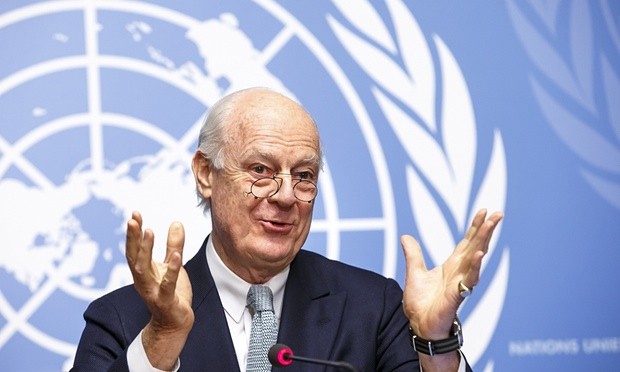UN talks on Syria to take place amid unsettled visions over essentials
The Guardian
Staffan de Mistura, UN envoy for Syria, plays down expectations for Geneva talks, predicting ‘a lot of posturing and walkouts’

UN talks on Syria are scheduled to begin in Geneva later this week, despite the continuing failure to decide who will represent the rebels fighting to overthrowBashar al-Assad, and a lack of agreement on other key issues, the organisation has announced.
Staffan de Mistura, the UN envoy for Syria, said on Monday that he planned to issue invitations on Tuesday with indirect “proximity” talks between the Syrian sides to begin on 29 January. They are expected to go on for six months. “It will be uphill anyway,” he predicted, apparently seeking to lower expectations of progress.
The talks had originally been slated to begin on Monday. Two previous conferences in Geneva in 2012 and 2014 failed to narrow gaps, let alone end the bloodiest crisis emerging from the Arab spring. “This is not Geneva 3,” De Mistura told reporters at the UN office in the Swiss city. “This is leading to what we hope will be a Geneva success story if we are able to push it forward.”
Syrian opposition officials, complaining of mounting pressure from the US to attend the talks without preconditions, are to meet in the Saudi capital, Riyadh, on Tuesday to discuss their final position.
A rebel negotiating committee, comprising political and armed groups, has insisted that talks cannot begin until airstrikes are halted, government sieges of opposition-held territory are lifted and detainees are freed.
Russia has been pressing hard for the inclusion of Syrians it supports as well as objecting to Islamist representatives it describes as terrorists. Kurdish participation is another bone of contention that Turkey is especially concerned about.
The UN envoy made clear that there would be no grand opening and that progress, if any, would be halting. “There will be a lot of posturing and walkouts,” De Mistura said.
“We should not be impressed or depressed. The important thing is to keep up the momentum. The name of the game is to be as creative and flexible as possible.” The first part of the talks would last for two or three weeks.
Al-Hayat, known for its accurate coverage of the diplomacy of the Syrian crisis, reported at the weekend that the US was urging the Syrian rebels to attend the talks or lose western support.
The talks are part of the Vienna process, launched in October in the wake of Russia’s military intervention on the side of Assad and amid a growing sense thatinternational efforts to end the conflict were going nowhere, with hundreds of thousands of Syrians dead and millions made homeless.
The novelty of the two sessions in the Austrian capital was that Iran and Saudi Arabia, Assad’s staunchest regional backers and opponents respectively, were both at the table for the first time. The downside was that neither of the Syrian parties were represented. Recent tensions between Riyadh and Tehran have further complicated matters.
The US and Russia, working more closely together since the autumn, have insisted that they want to proceed without delay.
De Mistura, the third UN envoy to Syria since the war began in March 2011, has skirted around the key question of Assad’s future. Syrian opposition groups insist that he must step down, but there are divisions over how long Assad might be able to stay on in the transitional government that was called for by the Geneva conference in 2012.
Opposition forces are demanding humanitarian access to besieged areas such as Madaya, where people are reported to have died from starvation, the release of women and children held by the government and an end to barrel-bomb attacks. The government wants to see attacks by the Jaysh al-Islam rebel group on Damascus halted.
The Syrian government team at the talks is to be led by Bashar Jaafari, the country’s ambassador to the UN, and Faisal Mekdad, the deputy foreign minister. The opposition team, representing political and armed groups, is headed by Assad al-Zubi.
How to submit an Op-Ed: Libyan Express accepts opinion articles on a wide range of topics. Submissions may be sent to oped@libyanexpress.com. Please include ‘Op-Ed’ in the subject line.
- Egypt’s billionaires: We’re all losing money - December 29, 2024
- Libyan minister conducts diplomatic visit to Syria - December 29, 2024
- SSA seizes uncertified medicines in warehouse raid - December 28, 2024


